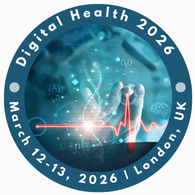Sessions/Tracks
Track 1: Diabetes and Digital Health
Diabetes Digital Health brings together the multifaceted information surrounding the science of digital health from an academic, regulatory, industrial, investment and cybersecurity perspective. Clinicians and researchers who are developing and evaluating mobile apps for diabetes patients will find this essential reading, as will industry people whose companies are developing mobile apps and sensors.
Key Features
-
Provides valuable information for clinicians, researchers and industry about the design and evaluation of patient-facing diabetes adherence technologies
-
Highlights cutting-edge topics that are presented and discussed at the Digital Diabetes Congress
Track 2: Clinical Research & Clinical Trials
Clinical Trial is a part of clinical research that follows a regulated protocol or a plan of action. They are primarily performed to get data on safety and efficacy of the new developed drug , this data is mandatory for further approval of the drug and to bring it to the market.
The clinical trials market has been estimated to reach USD 14.2 billion in 2016 and is projected to reach around USD 22 billion by the year 2021, growing at a CAGR (compounded annual growth rate) of 7.5%, during the forecast period 2016 to 2021. Key drivers impacting the market growth are globalization of clinical trials, development of new treatments such as personalized medicine, augmenting evolution in technology, and boosting demand for CROs to conduct clinical trials. Clinical studies can be sponsored, or funded, by pharmaceutical companies, academic medical centers, voluntary groups, and other organizations, in addition to Federal agencies such as the National Institutes of Health, the U.S. Department of Defense, and the U.S. Department of Veterans Affairs. Doctors, other health care providers, and other individuals can also sponsor clinical research.
Track 3: Medical Informatics
Medical informatics is the application of computers, communications and information technology and systems to all fields of medicine - medical care, medical education and medical research. The definition of Medical Informatics is dynamic due to the rapidly changing nature of both medicine and technology the sharing of a variety of information back and forth between people and healthcare entities. Medical Informatics is a new, exciting and evolving field. New specialties and careers are now possible. The expectation is that information technology will improve medical quality, patient safety, educational resources and patient-physician communication, while decreasing cost. Applied Medical Informatics studies the dispensation of medical statistics, the potent, management of information using computer technology, and the impact of such methods on medical research, education.
Track 4: Telemedicine and Telehealth
Telemedicine is the use of telecommunication and information technologies to provide clinical and medical health care at a distance. It helps to eliminate distance barriers and can improve access to clinical services that would often not be consistently available in distant rural communities. It is also used to save lives in critical care and emergency situations. Although there were distant precursors to telemedicine, it is essentially a product of 20th century telecommunication and information technologies. These technologies permit communications between patient and medical staff with both convenience and loyalty, as well as the transmission of medical, imaging and health informatics data from one site to another. It is a process for accurate data collection in digital format and an electronic medical record for data incorporation .Remote transmission Telemedicine is a system for automatically flagging and providing feedback for outlier data.
Track 5: Drug Discovery & Drug Screening
Reverse pharmacology includes drug screening deals with reverse pharmacology and forward pharmacology are two approaches to drug discovery. Target based drug discovery is the process through which potential new medicines are identified. It involves a wide range of scientific disciplines, including biology, chemistry and pharmacology, screening of chemical libraries and its pharmacology, methods to determine biological targeting, by systematically perturbing and interrogating biological pathways with synthetically novel chemical tools, preclinical validation of target biology is beginning to illuminate a more cost-effective and efficient paradigm for the development of novel drugs modulating novel targets.
-
Reverse pharmacology
-
Target based drug discovery
-
Screening of chemical libraries and its pharmacology
-
Classical pharmacology
-
Biotransformation of chemicals
-
Food and chemical toxicology
-
Food safety and toxicology
-
Food and cosmetic toxicology
Track 6: Digital Health Technologies
Digital health technology aims to boost our health and wellbeing, or to improve health systems. It includes smartphone apps, wearable devices (such as step trackers), and platforms that provide remote healthcare (telehealth). Software to help track symptoms, online tools to diagnose conditions, and programmes that analyse data from medical devices such as blood pressure monitors - these are all digital health technologies.
Digital health technologies use computing platforms, connectivity, software, and sensors for health care and related uses. These technologies span a wide range of uses, from applications in general wellness to applications as a medical device. They include technologies intended for use as a medical product, in a medical product, as companion diagnostics, or as an adjunct to other medical products (devices, drugs, and biologics). They may also be used to develop or study medical products.
Categories that come under this group include:
Track 7: m-health
m-Health is defined as the medical and public health practice supported by mobile devices, such as mobile phones, patient monitoring devices, personal digital assistances and other wireless devices. mHealth is already being used to monitor a variety of conditions including heart disease, diabetes, autism, insomnia and asthma. The WHO/ITU programme aims to assist governments to use mobile components to reinforce their existing national health activities to prevent, manage, and treat non-communicable diseases (NCDs) and their risk factors.
Benefits include:
Global mHealth Market was valued at $10.5 billion in 2014 and is expected to grow at a CAGR of 33.5% during 2015-2021. The mHealth market is in its nascent stage and is expected to yield significant revenues with increasing awareness and favorable regulatory impositions specific to the quality and feasibility of mobile-based medical devices. Penetration of mobile phones in healthcare segment has had a significant impact on the overall healthcare industry.
Track 8: e-health
e- health encompasses much of medical informatics but tends to prioritise the delivery of clinical information, care and services rather than the functions of technologies. Throughout many western national healthcare services, extensive e-Health infrastructures and systems are now viewed as central to the future provision of safe, efficient, high quality, citizen-centred health care. e- Health market growth is attributed to the transition of the healthcare industry into the digital healthcare system for patient’s management and analysis of health.
The global electronic health (e Health) market is growing at a swift pace and is projected to witness robust growth in the coming years. Technological developments, innovations, and the use of electronic devices are augmenting the global e Health market. The increasing adoption of these systems by medical practitioners across the globe is anticipated to offer promising opportunities for prominent players in the market. Global e Health market is expected to reach USD 308.0 billion by 2022, according to a new report by Grand View Research Inc. The transition of the healthcare industry into digital healthcare system for management and analysis of patient health is expected to be the most vital driver of the market.
Track 9: Ethical and Policy Challenges in Digital Health
Digital health encompasses a wide range of novel digital technologies related to health and medicine. Such technologies rely on recent advances in the collection and analysis of ever increasing amounts of data from both patients and healthy citizens. Along with new opportunities, however, come new ethical and policy challenges. These range from the need to adapt current evidence-based standards, to issues of privacy, oversight, accountability and public trust as well as national and international data governance and management. This review illustrates key issues and challenges facing the rapidly unfolding digital health paradigm and reflects on the impact of big data in medical research and clinical practice both internationally and in Switzerland. It concludes by emphasising five conditions that will be crucial to fulfil in order to foster innovation and fair benefit sharing in digital health.
Track-10: Genomics & Precision Medicine
Precision medicine makes use of variations in consumers genes, environment, and lifestyle to guide the prevention, diagnosis, and treatment of diseases. The potential for precision medicine to radically transform the healthcare industry is driving interest among a range of companies and government organizations. . Firms are flocking to develop the tools needed to extract, store, share, and analyze genomic data. The global precision medicine market is expected to grow at an annualized rate of 12% over 7 years to reach $88.6 billion by 2022, up from $39 billion in 2015, according to Market Research Future.
Track 11: Sensors & Wearables
The widespread adoption of consumer electronics—including wearable sensors and smartphones—has strengthened our ability to understand and intervene in many aspects of personal and population health and performance and create a critical path to health problem solving.
Wearable sensors in the form of smartwatches, bands, or rings are devices that monitor the activity and physiological parameters—such as heart rate or skin temperature—of the wearer. Marketed as exercise or lifestyle trackers to the general public, the measurements enabled by wearable devices can be translated into meaningful and actionable health information for individuals, clinicians, researchers, and the military. Using wearable sensors as data collection tools coupled with advanced data analytics can provide invaluable insights into the health status of individuals
Track 12: Digital Healthcare and Women’s Health
Digital healthcare can help women prioritise their health without the need to worry about missing time from work or household duties. It can make healthcare accessible at the comfort and safety of their home. Additionally, digital healthcare can also be used as a vehicle to promote sex education and sexual health awareness. It can help women get unbiased diagnosis and treatment without having to settle for the nearest expert.
In addition to all this, digital healthcare can provide long-term solutions and treatments which include therapy sessions, address cultural barriers around access to sexual healthcare and enable women to understand their body with the help of articles, videos and other patient education endeavours. The gendered nature of access to healthcare in India is undeniable. We discovered that women tend to postpone doctor visits unless necessary. Women frequently put their health on the back burner in order to save money. Women’s menstrual, sexual, and reproductive health issues have long been stigmatised, and many women have been prevented from seeking non-judgmental support. When it comes to women’s healthcare, there is a pressing need for a full-stack and holistic approach.
Track 13: Bioinformatics and Digital Health
Nowadays, it goes without saying that the use of information technology is important, even necessary, in the field of life sciences.
The amount of information that needs to be processed, analysed, stored, and represented is constantly growing. These data must then be integrated, compared, and viewed alongside other data to further knowledge and generate added value. Even beyond the issues presented by managing data and the effort required to process this information, the challenge is to improve the capacity of researchers to develop new hypotheses, produce innovative models, and test them.
Bio-Informatics and Information Management professionals are experts in managing the collection, storage, retrieval, analysis and interpretation of health care data and information. To provide the highest quality health care delivery, health care information is used not only for patient care, but also for medical legal issues, reimbursement, research, planning and evaluation. Opportunities for employment are found in a variety of settings, including hospitals, clinics, rehabilitation centers, home health agencies, health maintenance organizations, insurance agencies, governmental agencies, educational institutions and research centers
Track 14: Digital Therapeutics & Diagnostics
Digital Therapeutics (DTx) are evidence-based therapeutic interventions driven by software to prevent, manage, or treat a medical disorder or disease. In other words, DTx are patient-facing software applications that help patients treat, prevent, or manage a disease and that have a proven clinical benefit. For example, Digital Therapeutics can support patients in self-managing symptoms and thereby improve their quality of life and other clinical endpoints. DTx uses digital implements like mobile devices, apps, sensors, virtual reality, the Internet of Things, and other tools to spur behavioural changes in patients. DTx development can have a positive impact on providing well customised health services as their design is tailored to fit patient’s needs. Considered one of the most innovative areas within digital health, DTx ecosystem has experienced an accelerated period of progress over the past two years.
The process of identifying a disease, condition, or injury from its signs and symptoms. A health history, physical exam, and tests, such as blood tests, imaging tests, and biopsies, may be used to help make a diagnosis.
Track 15: Big Data and Digital Transformation
Big Data and analytics is an integral part of digital transformation .Many organisations have undergone a digital transformation to adapt the ever-changing digital landscape. They are achieving transformation through their control over Big Data and Analytics, and by using Machine Learning technology. Big data offers organisations the chance to learn more than what has ever been possible about what their customers want. Many health plans still rely on legacy technologies to power their business. This makes them vulnerable to customer-centric, tech-enabled newcomers. But IT leaders have a window of opportunity to unlock system data, enabling care orchestration.
Track 16: Digital Health Start-up Forum
Due to advancement of healthcare technologies, a number of start-up Companies utilises digital and Internet-based health technologies to make behavioural and lifestyle changes in patients. A number of start-up Companies based on Digital Health Therapeutics, telehealth, Digital Pathology, Digital health, e Health, mHealth Companies are being promoted with their latest innovative methodologiesthat uses digital implements like mobile-devices, apps, sensors, etc to spur behavioural changes in patients.
Track 17: Electronic Health record
An electronic Health record (EHR) is a person's legitimate health archive that is shared among numerous offices and organizations. The importance of EHRs is getting to be expanding compelling as more patient data winds up computerized and bigger quantities of consumers express a craving to have portable access to their Health records. Among other types of data, an EHR typically contains:
Contact information; Information about visits to healthcare professionals; Insurance information; Family history; Immunization status; Information about any conditions or diseases; A list of medications; Records of hospitalization; Information about any surgeries or procedures performed.
Track 18: Tele Surgery
Telesurgery additionally called as Remote surgery. Telesurgery is a capacity for a specialist to perform surgery on a patient despite the fact that they are not physically in a similar area. The principal genuine and complete remote surgery was led on 7 September 2001 over the Atlantic Ocean, with French specialist (Dr. Jacques Marescaux) in New York City playing out a cholecystectomy on a 68-year-old female patient 6,230 km away in Strasbourg, France. It was named Operation Lindbergh.
Remote telesurgery rises above the majority of the topographical limitations on specialized surgery. A man at the South Pole requiring surgery can have it there by remote telesurgery ("polar telesurgery"). A space traveller can be worked upon in a space station ("astrosurgery"). What's more, individuals in developing countries will have the capacity to profit by particular developing and not leave home for it.
Track 19: Bio Medical Informatics
Bio Medical Informatics is the use of biomedical data, information and knowledge for scientific inquiry, problem solving, and decision making, motivated by efforts to improve human health. It helps to eliminate distance barriers and can improve access to clinical services that would often not be consistently available in distant rural communities. These technologies permit communications between patient and medical staff with both convenience and loyalty, as well as the transmission of medical, imaging and health informatics data from one site to another. It is a process for accurate data collection in digital format and an electronic medical record for data incorporation.
Track 20: Artificial Intelligence and Digital Health
Digital health and artificial intelligence (AI) promises to change the face of healthcare. Reflecting this is growing interest in the digital health space, as evidenced by a substantial growth in investment over the past few years. Major players from the pharmaceutical, medtech, health insurance, retail and technology industries are all forging ahead with investments and internal product development.
Track 21: Blockchain Technology
Blockchain technology is a structure that stores transactional records, also known as the block, of the public in several databases, known as the “chain,” in a network connected through peer-to-peer nodes. Typically, this storage is referred to as a ‘digital ledger.’
Every transaction in this ledger is authorized by the digital signature of the owner, which authenticates the transaction and safeguards it from tampering. Hence, the information the digital ledger contains is highly secure.













